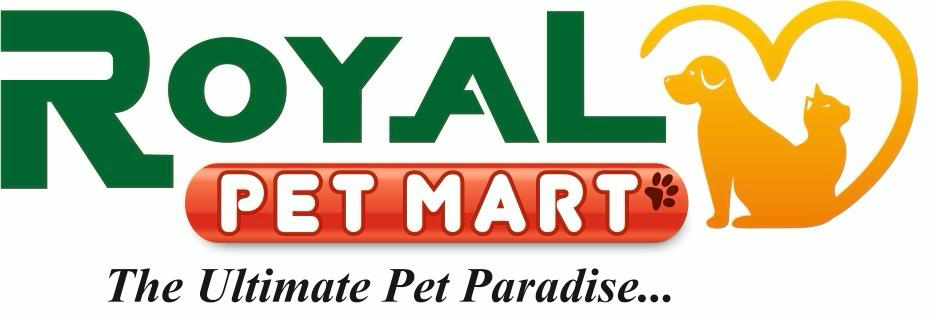The Truth About Dog Gut Health (and How to Improve It)
by Royal Pet mart on May 03, 2025

Introduction
When my dog, Luna, began having diarrhea last year I didn't think twice about it at first, I just figured she picked something up on one of our walks. But after a little while of it going on, I started to wonder whether Luna's gut health or dog gut health in general, could be a problem. I found out about dog gut health and realized it wasn't just digestion, but the gut immunity and mood and health overall! It's quite the cycle. If the gut is functioning well then your dog is probably happy and energetic but if not the dog will struggle with any number of health issues. In this blog I am going to share what I found out about dog digestive health, the signs to look for and how to improve your dog's gut health, and along the way I will introduce you to some great products from Royal Pet Mart!
Understanding the Dog Digestive System
I wanted to understand why Luna’s tummy was upset, so I looked into dog digestive system care. A dog’s digestive system starts at the mouth, where food is broken down, then moves through the stomach and intestines, where nutrients are absorbed. The gut microbiome—a community of bacteria and microbes in the intestines—plays a huge role in this process, aiding digestion and supporting overall health.
The dog gut microbiome also helps fight off harmful bacteria, supports the immune system, and even influences mood through the gut-brain connection. When Luna’s microbiome was out of balance, her digestion suffered, and so did her energy. Understanding this system helped me see why focusing on dog gut health is so crucial for her well-being.
Signs of Poor Dog Gut Health
Luna’s diarrhea was just the beginning—I started noticing other signs of poor dog gut health that worried me. Here’s what I learned to watch for:
-
Diarrhea or constipation: Luna’s loose stools were a clear red flag, but constipation can also signal trouble.
-
Gas or bloating: She’d get gassy after meals, and I could tell she was uncomfortable.
-
Bad breath: Her breath got noticeably worse, which I learned can be tied to gut issues.
-
Skin issues: She developed itchy patches, a surprising sign of gut imbalance.
-
Behavioral changes: Luna seemed more anxious and less playful, showing the dog gut health and behavior link.
Seeing these symptoms made me realize I needed to take action to improve dog gut health before things got worse.
Common Causes of Dog Gut Imbalance
Digging deeper, I found several causes of dog gut imbalance that might have affected Luna. A poor diet or sudden dietary changes was the biggest culprit—I’d switched her food too quickly, which upset her stomach. Over time, fillers or artificial additives in food can also impact the gut.
We know that overuse of antibiotics can also compromise the dog gut microbiome by indiscriminately destroying good bacteria along with the bad. Luna had taken antibiotics because of an infection that could also have contributed to her dog's digestive health issues. Stress and anxiety also contribute to dog digestive health. Stress about moving to another house had Luna nervous and may have affected her gut health. Environmental toxins:Her veterinarian also talked about environmental toxins like pesticide from the park; and there was a lack of dietary fiber in her diet, which I hadn't even discussed. Figuring out these causal factors made it easy to narrow down reasonable and practical solutions for her dog's digestive health issues.
The Link Between Dog Gut and Immunity
What surprised me most was how much dog gut health affects overall wellness. I learned that 70% of a dog’s immune system resides in the gut—the dog gut and immunity connection is huge! A healthy gut microbiome helps fight off infections, which is why Luna’s frequent colds stopped once I improved her diet.
The gut-brain connection also blew me away—dog gut health and mental wellness are linked, meaning an unbalanced gut can lead to anxiety or low energy. Luna’s mood improved so much after I addressed her gut issues. Plus, better dog nutrient absorption meant she had more energy for our walks. It all comes back to prioritizing gut health for dogs for their overall happiness.
How to Improve Your Dog’s Gut Health
I was determined to improve dog gut health for Luna, and here’s what worked for us:
a. Switch to a Gut-Friendly Dog Diet
I started feeding Luna whole, natural ingredients—think chicken, sweet potatoes, and veggies—avoiding fillers and artificial additives. A gut-friendly dog diet supports the microbiome, and I noticed her stools firm up within a week. Royal Pet Mart has a great selection of natural dog foods that made this switch easy and affordable.
b. Add Probiotics for Dogs and Prebiotics
Probiotics for dogs were a game-changer—they introduce good bacteria to balance the gut. Prebiotics, which feed those good bacteria, are just as important. I give Luna a daily probiotic supplement from Royal Pet Mart, and I also add natural sources like yogurt or bananas to her meals. Her digestion has never been better, thanks to these dog gut health supplements.
c. Use Digestive Enzymes
Digestive enzymes help break down food and improve dog nutrient absorption, especially for older dogs like Luna. I started adding an enzyme supplement to her meals, which I found at Royal Pet Mart, and it helped her body get more from her food—no more bloating after meals.
d. Manage Stress
Luna’s anxiety was affecting her gut, so I focused on dog gut health stress management. I kept her routine stable—no more sudden changes—and made sure she got plenty of exercise and mental stimulation, like puzzle toys and long walks. A calm dog means a healthier gut, and Luna’s been so much more relaxed.
e. Avoid Overmedication
I learned to use antibiotics and NSAIDs cautiously, as they can disrupt the gut. I now only give Luna meds when absolutely necessary and always follow up with probiotics for dogs to restore her gut balance. This careful approach has kept her dog's digestive health on track.
When to See a Vet for Dog Gut Issues
While I could generally stay ahead of most of Luna's issues at home, there were some instances when I needed to know when to go to the vet for dog gut issues. Persistent problems—like diarrhea for several days—were easy to recognize. Additionally, any sudden, severe issues (like vomiting blood) meant calling my vet. There are some medical scenarios that can indicate serious conditions requiring veterinary assistance.
I also learned a few things; for example, I stopped trying to be a vet myself—making guesses on medications can cause more problems than simply going to the vet. My vet's help and recommendations were critical in regaining Luna's dog gut health, and I always say, don't hesitate to consult with a vet if you're unsure!
Conclusion
Luna’s journey taught me the truth about dog gut health—it’s the foundation of her immunity, mood, and overall well-being. From a gut-friendly dog diet to probiotics for dogs and stress management, taking proactive steps to improve dog gut health has made her a happier, healthier pup. I found everything I needed at Royal Pet Mart, from dog gut health supplements to natural foods, making it easy to support her wellness.
I encourage you to prioritize gut health for dogs with these tips—it’s a small effort that pays off in a big way for your furry friend’s long-term health. Let’s keep our dogs thriving with the right care for their dog's digestive health!




